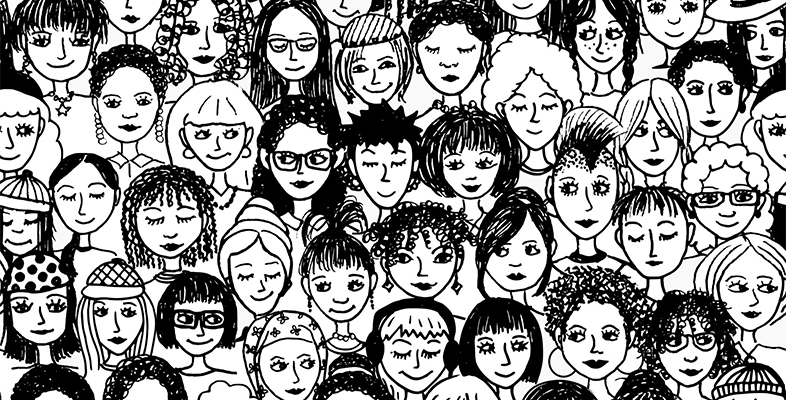2.3 Lay perspectives matter
It is important that professionals consider a woman’s understanding of their health when responding to her health issues. The biomedical approach has traditionally viewed lay perspectives as inferior, driven by personal opinion, and they often deviate from the scientific and technical knowledge of experts. Traditionally therefore, under a biomedical approach, the voices of female patients, their carers and other non-experts are viewed as less important than professional voices, knowledge and expertise.
By contrast, the social model of health suggests that a good understanding of lay knowledge can usefully inform expert knowledge. Rather than reinforce the distinctions between these forms of knowledge, academics following the social model argue that understanding how people construct and interpret health and wellbeing is vital to maintaining and supporting health (Yuill et al., 2010).
Women construct and interpret their own health and wellbeing based on all aspects of their personal identity and background. Psychiatrist Dr Micol Ascoli believes that being able to work with people’s own cultural interpretations of mental illness is crucial to supporting their recovery. She spoke to broadcaster and psychologist Claudia Hammond, about her work at Newham Centre for Mental Health in London. In the next activity, you will consider Dr Ascoli’s approach to her work and hear from one of her patients, Angela.
Activity 4 Working with lay perspectives of illness
Part 1
Listen to the following audio, which is an extract from the radio programme Mental health: mad or sad.
Transcript: Audio 2
SPEAKER 1: My dad's a pastor and I come from a Pentecostal background, so it's a lot of clapping, singing, shouting. We really believe in the spirit. It's very hard for a lot of the West to understand.
I see my bipolar definitely as a gift from God. Now, in the manic phase, you're entering into what I would call a spiritual dimension when I then read passages in the Bible. I'm like, wow, that means I've entered into a spiritual dimension. So I owe quite a lot of my religious beliefs to my manic experiences. And similar to my depression, I get some kind of healing because if I can identify people in my faith that have gone through my experiences, then I use those same strategies for myself.
SPEAKER 2: The art of cultural psychiatry is precisely to explore these different views, to get to an area of agreement and I think this work starts from the awareness that your own explanatory model is just as culturally determined as the patient's one.
The Western training can be very reassuring. You've got an international specification of mental disease. You've got the bulk of evidence that certain treatments work on symptoms, et cetera, et cetera. It took me a few years to realise that sometimes the outcome I look for are not the outcomes the patients look for. I look for symptom relief, discharge, improvement in functioning, quality of life.
But quality of life means different things to different people. Some patients tell me I'm quite happy to come to the hospital three times a year if this means that I can enjoy a satisfactory sexual life and a good set of activities, and be free from side effects from medications. People will talk about their culture, their belief, if they feel you are interested and if they feel they can do it safely without being stigmatised or without this resulting in a longer admission or high doses of medication.
SPEAKER 1: Whenever I talk to a mental health professional, they normally get involved when I have had the manic experience. They would pick me up from various places. They would say, how did you get there? And then I would say to them, I was flown there on the wings of the cloud. Literally, that's how my spiritual experience takes me. So they would say, my wings of the cloud, delusion. In a lot of the cases, I was sectioned.
SPEAKER 2: People from ethnic minorities are not always happy about the degree to which they perceive the problems are understood by mental health professionals. Things are to be improved, there's no doubt about it. There are huge variations in what is considered normal and abnormal in different cultures. A patient who tells you, I've got 150 brothers and sisters, what does he mean? Maybe it's just the family system whereas cousins of first, second, and third degree are considered in cold as brothers.
Tolerating a degree of uncertainty of meanings is quite hard and sometimes painful, I think, for us.
SPEAKER 3: So if someone is sitting in front of you in practise, what do you do that's different?
SPEAKER 2: You start with asking simple question, how do you call this problem? What does it do to you? What have you tried before? What's causing it, in your view, and then a lot of meanings come out of it. And then you try to accommodate into the care plan the things that the patient would want to do about it, with the common goal of the patient's getting better and feeling better.
For example, I did allow patients to have leave and go to a traditional healer or to a spiritual healer.
SPEAKER 3: If I were to come to you and say, what I'm having is a spiritual experience, but what you want to do is to treat it with medication, there's always going to be this divide, isn't there?
SPEAKER 2: Not necessarily. There are ways to fill the gap. For example, you can talk the medication through and show how it can make people stronger against, for example, spiritual intrusions or possessions. And also, I think we have to consider that in a globalised world, explanatory models are also sometimes multiple. It's not like you either believe in spirits or you believe in mental illness. Sometimes you believe in both.
SPEAKER 1: The reason why I take medication, even though I believe the spirit is the primary force, is because when I am manic, it's a gift that I believe is given to me.
Part 2
What lay perspectives on bipolar disorder are discussed in the audio? How did the speakers report the lay perspectives as being helpful? Add your findings below.
| Lay perspectives described by: | How this knowledge can help: | |
|---|---|---|
| Angela | ||
| Dr Ascoli |
Discussion
You may have found it refreshing to hear a medical practitioner so deeply engaged with lay perspectives. Below are some notes in response to the questions.
| Lay perspectives described by: | How this knowledge can help: | |
|---|---|---|
| Angela | She talked about her upbringing and religious background, particularly with regards to her believing in ‘the spirit’. She believes that her bipolar disorder is a gift from God. Medication is also a ‘gift’. |
She is able to make sense of manic and depressive episodes by linking to passages in the Bible. The way she views medication helps it to fit with her belief system. |
| Dr Ascoli | A patient’s desired outcomes from medical treatment can be quite different from the medical outcomes that the doctors normally work towards. Some groups can have different cultural constructs that cause professionals confusion. For example, some ethnic minorities may refer to ’brothers and sisters’ in a completely different sense to that normally applied in Western societies. |
Recognising that medical models are also culturally determined, and that taking lay views of health seriously helps patients. Better communication between healthcare professionals and service users can broaden understanding and ‘fill the gap’. |
Part 3
Think about a condition – a disease or disorder – that you or perhaps someone close to you has. What are your own beliefs about the causes of this condition? Are there any aspects of your background that helped to shape these beliefs?
Reflect on the two questions and then write a brief response below.
Whatever a woman’s beliefs about health are, it is likely they will have been shaped by many factors that are specific to that woman and may not always reflect wider assumptions held by society more broadly, or indeed fit with the biomedical model. This, however, does not diminish their potential value for understanding health and wellbeing because they will affect health behaviours, personal resilience and the ability to achieve health goals. Furthermore, sometimes the experiences and views of a particular group can have a profound and powerful effect on the views of wider society and alter the professional knowledge base as a result.
In the next section, you will consider the impact of social and cultural contexts on health and wellbeing by exploring issues of particular salience in terms of women’s health.

